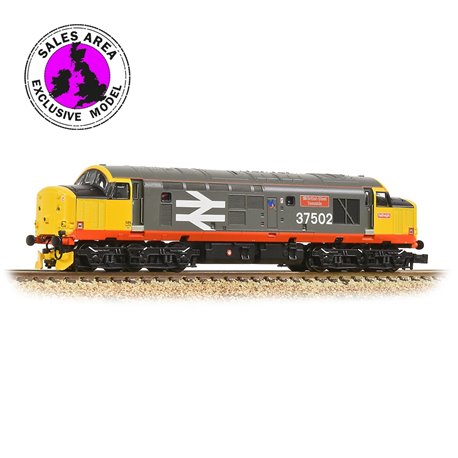No products
Product successfully added to your shopping cart
There are 0 items in your cart. There is 1 item in your cart.
Open on Good Friday
The shop will be open on Friday 18th April.
Bring us some chocolate!
 View larger
View larger Class 37/5 Refurb. 37502 'British Steel Teesside' BR R.F. (Red Stripe)
371-167TL
Graham Farish
Class 37/5 Refurb. 37502 'British Steel Teesside' BR R.F. (Red Stripe)
This product is out of stock
| Scale | N (1/148 - 1/160) |
| Material | Plastic |
| Assembly | Ready to use |
| Finish | Painted |
More info
Class 37/5 Refurb. 37502 'British Steel Teesside' BR R.F. (Red Stripe)
The Class 37 is a favourite for many and the Graham Farish model captures the unmistakable look of the 37, with this version correctly exhibiting the characteristics of a refurbished loco – most notably the flush ends where the headcode boxes have been removed, and the fitting of a high intensity headlight which is operational, of course. The Railfreight Red Stripe livery is certainly eye catching, with the grey body contrasting against the yellow and black nose ends, along with the prominent red stripe at solebar level. The large logo and running number stand out on the bodyside, whilst the nameplate and Kingfisher monogram complete what is a very attractive model indeed.
MODEL FEATURES:
Graham Farish N Scale
Era 8
Pristine Railfreight Red Stripe livery
Running No. 37502
Named ‘British Steel Teesside’
Accessory Pack
NEM Coupling Pockets
Powerful 3 Pole Motor
Directional Lighting
Equipped with a 6 Pin DCC Decoder Socket – Recommend Decoder item No. 36-568A
Length 125mm
Sales Area Exclusive Model – available from retailers in selected areas (see map for more details)
CLASS 37 HISTORY
The British Rail 1955 Modernisation Plan paved the way for the large-scale replacement of steam traction with diesel locomotives, and one of the most successful diesel locomotive designs to result from this was the English Electric Type 3. These 1,700hp Types 3 diesel-electric locomotives were built at English Electric’s Vulcan Foundry and by Robert Stephenson & Hawthorns between 1960 and 1965, with 309 examples produced in total.
The class proved popular with railwaymen and so in 1985, a major refurbishment programme for the Class 37 locomotives was sanctioned to extend the working lives of 135 locomotives. Features of the refurbishment involved plating over the four-character head codes and sealing off the nose end communication doors. Dedicated freight locomotives received lower gearing to increase the tractive effort, and some were fitted with extra ballast or even more powerful engines. A new subclass was created for locomotives refurbished with Electric Train Heating (ETH) equipment, allowing their use on passenger trains the whole year-round.
With the sectorisation of British Rail taking hold in the early-1980s, the locomotives returned to traffic following refurbishment in a wide and diverse range of liveries. Passenger machines appeared in BR Blue Large Logo, InterCity and Regional Railways schemes to name just three, whilst freight engines received numerous varieties of Railfreight livery, Transrail, Mainline and Loadhaul. The Class continued to be widely used into the Privatisation-era, with examples operating for the likes of EWS, DRS, West Coast Railways and Colas, whilst others have received ‘retro’ heritage repaints.

